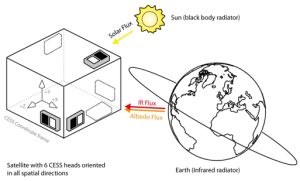Understanding Sun Sensor Satellites
Sun sensor satellites are equipped with devices that detect the position of the sun relative to the spacecraft. This information is crucial for determining the spacecraft’s orientation in space, which is known as attitude determination. The ability to accurately track the sun’s position allows the spacecraft to maintain its intended trajectory and function optimally.
Key Features of Sun Sensor Satellites
Sun sensor satellites are designed with several advanced features that enhance their performance and reliability:
- High Accuracy: These sensors provide precise measurements of the sun’s position, enabling accurate attitude determination.
- Durability: Built to withstand the harsh conditions of space, sun sensors are robust and reliable over long missions.
- Low Power Consumption: Efficient energy usage ensures that the sensors do not drain the spacecraft’s limited power resources.
- Compact Design: The sensors are lightweight and compact, making them suitable for various types of spacecraft, including small satellites.
Applications of Sun Sensor Satellites
The versatility of sun sensor satellites allows them to be used in a wide range of space missions. Their applications include:
- Satellite Orientation: Ensuring that communication and observation satellites maintain the correct orientation for optimal performance.
- Interplanetary Navigation: Providing accurate attitude information for spacecraft traveling to other planets or celestial bodies.
- Earth Observation: Enhancing the precision of earth observation satellites, leading to better data collection and analysis.
How Sun Sensor Satellites Work
Sun sensor satellites operate by detecting the sunlight that strikes the sensors. The sensors convert the sunlight into electrical signals, which are then processed to determine the sun’s position relative to the spacecraft. This data is used to adjust the spacecraft’s orientation, ensuring it remains on the correct path.
Advantages of Using Sun Sensor Satellites
The implementation of sun sensor technology offers several advantages:
- Improved Navigation: Accurate sun position data leads to better navigation and control of the spacecraft.
- Enhanced Mission Success: Reliable attitude determination contributes to the overall success of space missions.
- Cost-Effective: Sun sensors are relatively low-cost compared to other navigation technologies, making them a cost-effective solution for many missions.
Future Developments in Sun Sensor Technology
As space exploration continues to evolve, advancements in sun sensor technology are expected to bring even greater capabilities. Future developments may include:
- Increased Precision: Enhanced sensor technology will provide even more accurate attitude determination.
- Integration with Other Sensors: Combining sun sensors with star trackers and other navigation devices for improved performance.
- Miniaturization: Further reduction in size and weight, making sun sensors suitable for even the smallest spacecraft.
The sun sensor satellite is a crucial component in modern space exploration, providing accurate and reliable attitude determination for a wide range of missions. With ongoing advancements in technology, these sensors will continue to play a vital role in the success of future space endeavors. Understanding the importance and functionality of sun sensor satellites is essential for anyone involved in the space industry, as they are key to ensuring the precise navigation and control of spacecraft.
